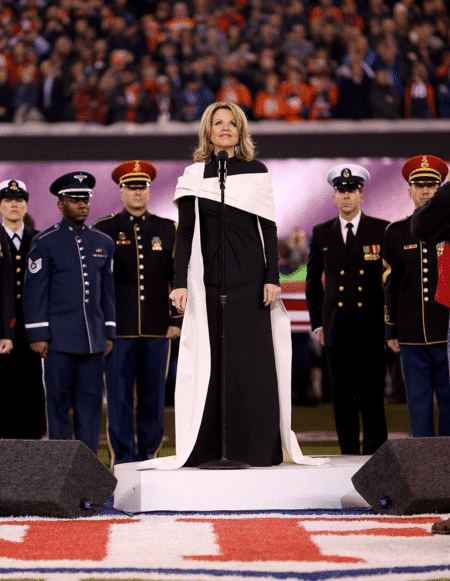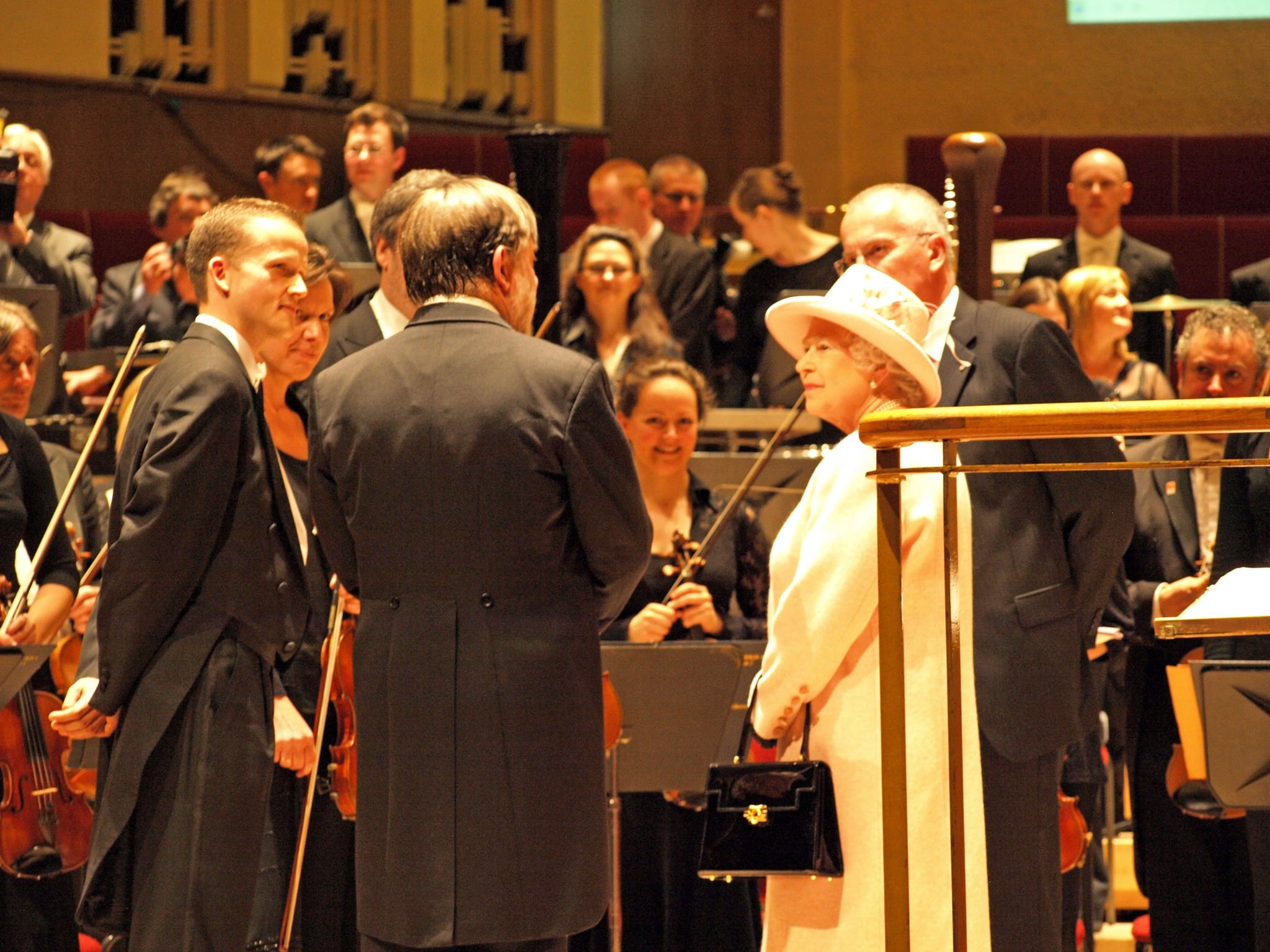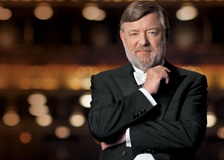John McCain requested Renee Fleming for his funeral
mainShe will sing Danny Boy at the farewell on Saturday.
More here.


She will sing Danny Boy at the farewell on Saturday.
More here.

Statement by the Berlin Phil: It is with…

The composer Michael Tippett referred to him as…

Don’t say you haven’t dreamed of this. The…

Explaining Elgar to Australia.

Session expired
Please log in again. The login page will open in a new tab. After logging in you can close it and return to this page.
I definitely agree with McCain’s taste in singers. Regarding the photo above, we might recall a famous quote by McCain (who was quite admirable in many ways): “War is wretched beyond description, and only a fool or a fraud could sentimentalize its cruel reality.”
I realize that he comes from a military family and was a POW who was treated brutally for five years, but I hope our government will eventually evolve beyond militarizing so many of its public events. And exactly because this meaningless militarization sentimentalizes the cruel reality of war. The military should be valorized on appropriate occasion, but not as a regular practice. It’s not good for the soul of a nation. The Europeans learned this. Eventually the USA will too.
Anyway, may McCain rest in peace.
Well stated (although we can disagree about the late McCain’s taste in singers). In any case and on a similar note, I find the “Rule Britannia” display at the Proms distasteful and, in fact, creepy. Not far fetched to jump from that bandwagon onto white nationalism or somesuch. Renee Fleming has naturally sung Rule Britannia (oblivious to the former Imperial power’s acts and consequences, which we are still living under — never mind that, as an American, her own country fought hard against British rule — but never mind) as well as other military themed events over time on her side of the pond. So she appears to have no qualms about lending her services to the military establishment/brass.
Some years ago here on SD I expressed my concerns about the nationalism of the Proms which seemed overdone to the point of being inappropriate. A whiff of the forces leading to Brexit was already plainly in the air, but few sensed where it was leading. All I can say from a larger perspective is that some people seem to have very short memories. Thankfully I think continental leaders do remember that history and will formulate agreements with the UK to avoid the worst sorts of nationalistic chauvinism. And I’m fairly sure that if the ghosts of the past begin to take truly concrete form, the Brits too would say, never again. Anyway, it’s interesting how one can see these terrible forces of history at work in how people make music.
You seem to be either incapable or unwilling to see the difference between a light hearted, patriotic end-of-term party, and nationalism.
As for “whiff of the forces leading to Brexit”, the Last Night has been around for a long time and London, where I suspect most of the promenader live, voted remain.
Abject nonsense.
I fear that you entirely misread the British sense of patriotism. Our patriotism is not like that of the Americans or the Russians or even of the Poles or the Hungarians. What are the things of which the British are proud? I should guess that they would include afternoon tea, choral evensong, the boat race and varsity match, sportsmanship, fair play, and rooting for the underdog, the BBC, policing by consent, the independence of the judiciary, a free press, public transport, Shakespeare, national parks, and a sense of humour.
Some of our most celebrated military endeavours, such as Dunkirk and the Dam Busters raids, were also, to put it mildly, among our least successful. Similarly, our most treasured cultural responses to war, such as almost of all the war poets, Britten’s War Requiem, and Tippett’s A Child of Our Time, are resolute statements against war. Our Bomber Command memorial bears an inscription observing that the monument “also commemorates those of all nations who lost their lives in the bombing”. It must also say much about the national character that there is a statue of George Washington in Trafalgar Square. How many other countries would erect a monument commemorating an enemy military commander responsible for the most devastating defeat in the nation’s history? We also have a statue of Gandhi, responsible for securing the independence of our most important imperial possession.
So I think that you have seriously misconstrued the mood of the event if you think that a little good-humoured, and often irreverent, patriotism at the Last Night of the Proms is intended to convey anything approaching nationalism. Furthermore, if you saw the Last Night over the last couple of years you will have noticed a large number of revellers waving EU flags.
You omitted the NHS from your most-proud list. Doesn’t it almost always top the list of most-popular, at least?
You’re probably right, although personally I’m not sure that the NHS in its present condition is much to be proud of. Other countries (most developed countries that are not the USA) have healthcare systems that are free at the point of use that work much more efficiently. To say so, however, is tantamount to advertising oneself as a Jesuit during the reign of Elizabeth I, which is one reason why meaningful reform never takes place. A couple of years ago an A&E nurse told me that she had treated a German tourist who had been somewhat surprised to be told that he would have to return on a future date for an MRI scan, explaining that in a German hospital an MRI scanner and staff able to operate it would be made available almost immediately. She recounted with evident satisfaction how she had told him that “that isn’t the way we do things here”. She actually seemed to be rather proud of the fact that the waiting time for an MRI scan is longer here than it is in Germany, whereas I think I would have been inclined to say, “Yes, I’m terribly sorry, but our healthcare system is considerable less efficient than yours, leading to waiting times that are at best inconvenient and at worst detrimental to healthcare outcomes.” But, yes, the British are in general very proud of it, I have to admit that.
I think what’s happening to it is tragic, I don’t understand why angry mobs haven’t confronted the govt. May.
A sign of the Service’s desperation is the unprecedented access it has granted to BBC camera crews — any TV crews — to show what is happening. This includes I think a whole series called “Hospital”. This would never be allowed in the US. Reminds me of the The Royal Opera House series, permitted when the admin was seeking public support.
And to think that the UK is driving away the overworked doctors and exhausted ill-paid nurses — by one means or device or hostile atmosphere or impossible conditions to “back where they come from” — congratulations, English.
How does the UK treat its foreign professionals? See if you can get though this without grinding your teeth down:
https://www.newstatesman.com/politics/uk/2018/08/freezing-sheds-and-vanishing-documents-why-immigrants-us-are-quitting-uk
“never have been allowed” — I mean by hospital public relations. Health care here of course remains Way behind you still, the whole population considered.
Indeed. I’ve only seen bits and pieces of those TV series, but I think the general direction of the narrative is that hospitals are grossly overstretched and that planned procedures are being cancelled all over the place to make way for emergencies and more urgent cases. In one episode a surgeon was seen buying a bed (with NHS money) in a private wing of an NHS hospital (the profits of which go back to the NHS) because there wasn’t a free bed in the NHS wing of the same hospital, and this was only happening because the patient’s operation had already been cancelled multiple times. The message it conveys to the public is indeed that the service is at breaking point.
Alex: first, your list of things “the British are proud of” is either a parody list (it made me laugh), or you are unaware how it reflects the values of someone who is older, middle-class and from the South-East. While there is nothing particularly wrong with being from that segment of society, it represents far too small a part of Britain to properly represent “English National feeling”.
As for the NHS. It must, by design, entail queueing since it is “free-at-the-point-of-use”. Germans, and other Europeans, invariably must pay a small charge to use their health system. This ensures that their health care system is largely used only when it is needed. In the UK you pay by time (e.g. by waiting) rather than by money. The overall health outcomes are similar to the rest of Europe.
militarizing so many of its public events: what do you mean? Examples?
On a cultural level, state funerals, diplomatic greetings, the opening ceremonies of football games, parades, the militarization of the police, the massive ad campaigns of the military, the opportunistic use of militarism in political campaigns, the military mannerisms instilled in society by such a large part of the populace being in or closely associated with the military. On the broader level, globalist interventionism, the military industrial complex, the promotion of an instrustive national security state.
There’s a lot of good writing available about this. An example:
https://nationalinterest.org/blog/the-skeptics/the-creeping-miltiarization-american-culture-16207
There’s also the militarization of our language and the increasingly common usage of military metaphors in daily discourse. Language like that shapes how people think and how they see society. Europeans, including even the Brits, find such language troubling because they have a better sense of the horrors of war. Excessive militarism in language and thought is considered poor taste — and just a bit stupid.
Not to mention the Orwellian language of the progressive left and identity politics. That great author was prescient.
Sue: we’ve already established that you know sweet FA about Orwell and his writing. Best you go off and listen to another Jordan Peterson lecture, then come back and tell us how we should all be lobsters keeping our pots nice and tidy…
Point well taken. It’s been true for decades. In fact, the late comedian George Carlin had a brilliant routine on the differences between American football and baseball.
You’ll see the relevance to the topic by watching one of the many versions of Carlin’s routine that are sitting about on YouTube:
https://www.youtube.com/watch?v=aIkqNiBASfI
Most of the things you mention are presumably specific to the USA. I don’t go to many sports matches in the UK, but as far as I can recall I don’t remember seeing any military personnel. Before rugby matches (at any rate those taking place at Twickenham, “The Home of England Rugby”) it is customary to sing Jerusalem, but that’s hardly militaristic. Obviously the national anthems of both countries are performed at international fixtures, but I think that’s standard all over the world.
As for state funerals and diplomatic events, isn’t one reason that the military are involved simply that they are the people who have the required skills? For one thing, at British state funerals the gun carriage carrying the coffin is pulled by naval personnel rather than horses, but this is just a tradition dating from Queen Victoria’s funeral when the horses failed and some naval ratings stepped in to pull the gun carriage instead. More generally, it is the military who have the horses and the marching bands. Presumably there is also some diplomatic protocol that dictates that visiting heads of state enjoy the protection of the host nation’s armed forces. And you may not like to think about it this way, but the chief responsibility of the state is, of course, defence, and the head of state is normally the head of the armed forces (at least ceremonially). Yes, we also look to the state to provide health, education, housing, infrastructure, and so on, but if the state isn’t adequately defending itself none of those things count for anything.
McCain operated as Queen Bee of our defence and foreign policies entirely too long using the power of what should be rotating chairmanships and parlaying his military service and suffering into holier-than-thou incorrigibility. Politically he was an ass on two legs, and incompetent in oversight of the defence budget. He died bitter at Russia, viewing that Christian country as the evil behind North Vietnamese abuses and impairing to this day our ability to formulate good policy toward it. His power should have been limited to 1/100th of the Senate’s, commensurate with Arizonans’ role in national life. Instead he embodied the grossest disproportion of clout since Robert Byrd. It will be a magnifient service in the USNA’s chapel, without or with our strong president and La Renée.
If you look at the flags which Promenaders wave at the Last Night of the Proms you will see that they are from all over the world, people just celebrating. I hate it because of the jingoism and Land of Hope and Glory was my school song ugh.
Is it really jingoistic? I thought that the current thinking on Elgar was that his music was more recessional in tone, a tribute to the passing glory of empire, foreshadowing its imminent decline. Anyway, patriotic music has been performed at the Last Night of the Proms more or less since its inception, and the current programme has remained more or less unchanged for over 60 years. It’s really just a tradition. I shouldn’t think that anybody who goes to the Last Night of the Proms really believes in the expansion of the British Empire, which today continues to hold sway over a population roughly the same as that of Luton (not including the penguin population on our possessions in the southern Atlantic Ocean). Think of it as being a little like Easter. For every five British people who indulge in a Cadbury’s Creme Egg, slightly fewer than one of them actually believes in the resurrection. Twenty or thirty years from now there’ll be hardly anybody alive who even remembers the British Empire in any meaningful sense, but I bet there’ll still be a Last Night of the Proms.
I’m sure you’re right on all points, you see and understand things close up. From a distance though this slowness to update the fluff rings a note ranging from pathetic to just plain weird.
Why these various orders “of the British Empire” and the rest, not to speak of ruling the waves and other nonsense that went out generations ago? Do other countries crow openly of a German Empire, a French, a Russian, even as the effort is on to rebuild the last?
Bohemia hasn’t forgotten its imperial past nor has Lithuania or Poland or a score of other little countries but they save it for private special moments of weeping in the Pilsner. Britain’s sentimentality puts paid to the illusion of its cleverness, sophistication, as if Brexit hasn’t buried it forever by now.
I imagine the reason is because the UK has had a more continuous (or, if you prefer, less disrupted) history than Germany, France, or Russia. The Germans would hardly talk about a ‘German Empire’ as it would be unclear whether they meant the Holy Roman Empire, the Second Empire, or (least probably of all) the Third Reich. Furthermore, in between the periods of the three empires there were periods when Germany wasn’t an empire at all. After the Second World War Germany understandably made an emphatic break with its recent past and left behind all notions of ‘Reich’. Likewise, France has had not only two ’empires’ (as well as its actual overseas empire), but also five republics, several different monarchies, a revolution, and a civil war, not to begin to consider what happened during the Second World War. And the same with Russia (two revolutions, a civil war, foreign wars, the Republic, the Soviet Federative Socialist Republic, the USSR, the Russian Federation). Clearly expressions of patriotism in these countries are going to look very different today than they did even within the recent past. Britain’s history has been very different. Our last major constitutional upheavals were the Glorious Revolution of 1688 and the Bill of Rights of 1689. The country we live in today has not changed in any fundamental way since Thomas Arne composed Rule, Britannia! in 1740.
With regard to the Order of the British Empire, I agree that the name now sounds anachronistic, but I think the main reasons it persists are (a) there hasn’t yet been a sufficiently compelling for it to be changed and (b) nobody has come up with a satisfactory alternative. The order was founded in 1917 when the British Empire was still very much a reality, and since then, although we have lost the empire, we have suffered none of the constitutional upheavals of, well, almost every other country in Europe. The name ‘Order of British Excellence’ has been suggested, but it sounds a bit silly. Perhaps when the Queen dies they’ll consider renaming it the Order of Queen Elizabeth or something like that. Of course, most of our orders of chivalry have rather silly sounding names today (the Garter, the Thistle, the Bath), but they’ve now existed for so long that they don’t actually sound that strange and it would be a kind of historical vandalism to change them. The Order of the British Empire, however, is not particularly old, so the name does not yet sound timeless and changing it is not unthinkable.
@Alex Davies: The central point about the British Empire is that it’s Over, unless you place a high value on Gibraltar. That might be on its way out too.
It appears that many in Britain fail to realize this, leading to the delusions of an expansionary Brexit and the slow inexorable tragic consequences still hidden in the future.
That’s why I think such froth as the titles matters. I’ve been wrong before.
Buxtehude: I agree that too many Britons have not realised that Britain is no longer an important power. And this misunderstanding partly drives the more extreme Brexiteers. But as many people in Britain do understand where it really stands in the world.
The sadder truth is that the era of easy American hegemony are over, but too many Americans are unaware of this essential truth. Spending on the military won’t solve this issue.
A Senator Masquerading as a Gas Station
http://cluborlov.blogspot.com/2018/08/a-senator-masquerading-as-gas-station.html
“War is wretched beyond description, and only a fool or a fraud could sentimentalize its cruel reality.”
That didn’t stop him to be one of the most active falcons and war mongers, calling for military interventions in the interest of a moneyed few more often than most. He was essentially a mercenary, as a soldier first, later as a politician.
Anyone should be remembered for his deeds more than for his words. His deeds killed thousands of innocent people. May he rest in peace.
“His deeds killed thousands of innocent people”: can you please elaborate?
McCain’s rejection of Obamacare repeal has arguably already saved lives. No matter what his motives were, his vote made all the difference.
True. Even though his motivation for that vote might have been more to hurt Trump, the effect is nevertheless as you describe. I was talking more about his drumming up for military interventions, even far beyond the Neocon fraction or GOP mainstream party line, his psychopathological emphasis on American exceptionalism and global hegemony, in the last decades of his political life.
Renee Fleming singing along to “Rule Britannia” at the Proms. Didn’t anyone notice that she took out a small American flag and waved it? Perfect!
an occasion to hope that THE LAST TRUMP will sound and be silent thereafter
Hope springs eternal, but the racist-in-chief is not famous for shutting up or advancing factually correct information.
I was partly wrong: IT is famous for shutting up when it comes to unequivocally condemning white supremacists, religious discrimination, racism…
He should have picked Fleming for his running mate in 2008 and left it for Sarah Palin to sing at his funeral, at least he would’ve been spared the listening.
Anyone remembering the 2008 campaign should get a good laugh out of this “man-of-peace” stuff, not to speak of his original support for invading Afghanistan and Iraq, bombing Iran (later claimed to have been a joke), “replacing” Gaddafi, sending the troops into Syria, attacking N Korea (if only in retrospect, he was both for and against this) — I imagine an expert would produce a much longer list.
He is celebrated for his heroic resistance to torture as POW and as contrast to Trump. McCain was normal. Trump is not normal, to an increasingly terrifying degree.
Also as a relic of a less divided senate, when bipartisan work and votes were ordinary.
Well it’s a bit like George W. Bush. When he was governor of Texas he was portrayed in the British media as a barely literate recovered addict with an excessive fondness for capital punishment. As president he was considered to be at best a warmonger and at worst a war criminal. With the election of Trump we’ve had to re-evaluate him as a fundamentally decent chap who may have made some questionable foreign policy decisions. Likewise John Major. His appointment as prime minister seemed so improbable that he himself remarked, ‘Well, who would have thought it?’ He was lampooned in the press as a man so boring that his skin was grey and he tucked his shirt into his underpants. With the publication of Edwina Currie’s diaries he found himself at the centre of the most unexpected sex scandal in British political history. And yet in light of David Cameron’s premiership his reputation has gone from strength to strength and he has now emerged as something of a statesman.
It’s misleading to color the past with the present. Jr. Bush was the true precursor of Trump, any sweetness of his personal personality notwithstanding. Look what this aggressive ignoramus set afoot in the middle east, and it’s not over yet! This MBA pushed the pedal to the metal on the market-liberal revolution and presided over the near collapse of the world financial system. Nice going, big guy!
It’s true that this last was part of a bi-partisan surrender that got underway with Reagan, our American Thatcher, and had a huge boost from Clinton as well as the pair of Bushes. But the long-lasting universal disgust with Jr Bush should be remembered,
J.M. Keynes was not Karl Marx, let alone Lenin or Stalin, as the deep bassoons would have us believe, and we’ll need his help to climb out of the hole about to open beneath us once again.
As far as Bush Jr. is concerned, he was sufficiently clueless, a puppet in the oval office, while Cheney, Rumsfeld, Wolfowitz and the rest of that Neocon gang were having their neocon ‘New American Century’ orgy.
I want Mahler 8 at mine, conducted by Mahler.